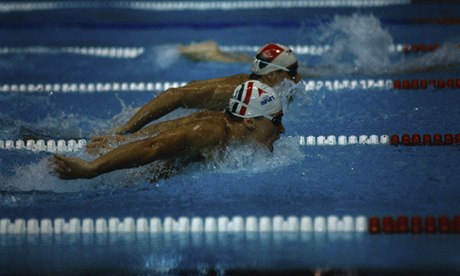
A confession: I was one of the few who did not get along with The Slap, Tsiolkas's previous novel, which was longlisted for the Booker prize and became a reading group sensation. So I began Barracuda with some trepidation. Twelve pages in and I found myself struggling. The novel felt two-dimensional, too pat in its inverted snobbery, over-solicitous of sympathy on behalf of its protagonist. Here was the identikit ugly duckling Danny Kelly (aka the eponymous Barracuda) from the wrong side of the tracks et cetera, et cetera. He had won a swimming scholarship to what he called "Cunts College", a school where all the boys were "filthy rich" and had "perfect golden hair, perfect clear skin". The first words he heard on arrival would surely prove to be the obvious distillation of all that was to come: "Hey, what are you doing here?" Oh Christ, I thought: 500 pages of plod and predictability.
I could not have been more mistaken. By page 70, as assiduous mother shaved the body hair from ambition-maddened son in a motel room before the 1996 Olympics 1500m freestyle swimming final, I realised I was reading something resonant, epic and supremely accomplished. Thereafter, I found myself more and more admiring of the subtle, textured, profoundly human way that Tsiolkas was handling his subject. And I finished Barracuda on a high: moved, elated, immersed.
What's to love? Well, first of all, the actual writing became so vivid and vital and involving – direct, real, authentic – that I found it gradually had the effect of making the other novels I had on the go seem as though I were reading them through Vaseline-smeared lenses. Then there was the increasing richness, range and depth of the characterisation: father, coach, mother, siblings, best friend, lover, cousin, aunt, rivals, rival's grandmother, rival's sister, the smallest kid at the school – all were rendered with skill, nuance and conviction. Tsiolkas, I came to realise, was consistently and ferociously engaged with the unique (and surely principal) concern of the novelist: the inner lives of the people about whom he has chosen to write. As James Wood, the great critic, has said of Tolstoy's characters, "They are so real to the reader because they are so real to themselves."
Naturally, such characterisation married to so kinetic a prose style made for some riveting dialogue – with some off-the-scale moments. But wider than this, I was progressively engaged by a consummate scene list wherein the elements of love, hate, friendship and enmity continually realigned, clashed, bonded, shattered and boomed.
There were so many highlights. The violence between Kelly and his great rival-and-crush Martin Taylor. The four lovers eating on the beach on Australia Day, discussing racism and children. The witheringly toxic arrival of the aunt. The fight on the sports field. The father and son showdown when they finally look "at each other cleanly". The utter desolation – tragic, claustrophobic, terrifying – of the night of the Sydney Olympics opening ceremony. The confrontation between the father and the headmaster. The funeral. The scenes in the pool…
But I now realise I haven't said what the novel is about yet. Well, it's about a boy whose all-consuming desire is to become an Olympic gold medallist at swimming. And it's about what happens to that boy when he fails – that boy who must somehow become a man. (This is why I think I didn't like the beginning: because Tsiolkas has to start unsubtly, adolescently, in black and white, so that the protagonist can develop in all the dozen directions and shades that Danny Kelly does.) But, really, what Barracuda is about is family. Or class. Or race. Or money. Or belonging. Or growing up. Or the lies embedded in how we make the world. Or Australia. All of this and more.
Actually, what it is really, really about is rage, indignation, psychological suffering, shame: "A life lived in and only through shame."
I had two small reservations. I'm not sure I bought Barracuda's developing passion for great literature – or, if I did, not to the point where he tears out pages of Chekhov in prison so as to treasure them "folded inside a tear in the mattress… Had he ever known such joy?" (This was the only time I was aware of the author.) And second, I felt that the centrifugal scene – in which Danny comes fifth in a race – was the least well realised of those in the water. I wanted more. I wanted stroke-by-stroke chaos and collapse and a vivid, screaming, reality-ripping sense of what this moment felt like; but, in terms of the race itself, this passage seemed ever so slightly under-delivered.
Make no mistake, though: this, Tsiolkas's fifth novel, is the work of a superb writer who has completely mastered his craft but lost nothing of his fiery spirit or instinct in so doing. Barracuda is a big achievement. Not least because, for all its power and glory, for all its sound and fury, it everywhere manifests "the ruthless calm of the truth".

